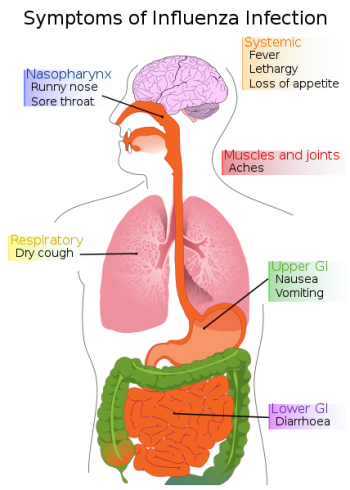Influenza
Contents
Description & Causes
Influenza is an acute viral infection of the respiratory tract which is highly contagious and easily spread by sneezing and coughing. Flu symptoms can be very extensive and include; chills, fever, sore throat, headache, stomach pain, cough, enlarged lymph nodes, body aches, vomiting and diarrhea. Serious complications may arise when infected with the flu, such as pneumonia and sinus or ear infections.
Treatments
Many doctors recommend annual flu vaccines to attempt to help the body become immune to specific viruses. However, the components of the vaccines and certain side-effects that may occur, make this a controversial subject in modern day medicine. Some prefer to build their immune system in more natural ways through nutrients and alternative medicines.
Basically, when someone contracts influenza, they just try to treat the symptoms and do their best to avoid complications. The fever that usually accompanies the flu requires additional calories in several small feedings, and additional B-complex vitamins to help metabolize these calories.
Protein is needed to repair any tissue destroyed by high fever. Infections accompanied by fever also increase the need for additional vitamin A (protective of the lining of the throat), and vitamin C. Increased fluid intake is essential when fever is present.
Vitamins & Nutrients
Nutrients that may be beneficial in both the treatment and prevention of influenza are:
- Vitamin B-complex
- Vitamin A
- Vitamin B1
- Vitamin B2
- Vitamin B6
- Vitamin B15 (panthothenic acid)
- Vitamin C
- Niacin
- Protein
- Zinc
Helpful Herbs
Here are some of the herbs proven to improve the symptoms of the flu.
- Elderberry
- Echinacea
- Ginkgo
- Garlic
- Pau D' Arco
- Ginseng
- Chamomile
- Angelica
- Astragalus
- Bayberry
- Blue Vervain
- Catnip
- Peppermint
- Pleurisy Root
- White Pine Bark
- White Willow (fever, aches)
Related discussions
- How To Use Vitamin C for Disease
- Walgreens announces flu shot gift card (opinion)
- The common cold/flu: what are your recommendations?
